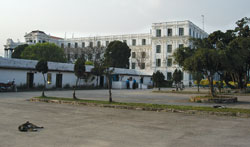|
|
| OBLIVIOUS: Parliament didn\'t meet on Thursday, as talks continued about the CPN-M joining the interim government, but lawmakers should be planning for a longer interim phase. |
When the interim government is finally complete, the 7+1 parties will face more challenges: postponing the constituent assembly elections and creating conditions for a later, but freer and fairer, election. With the delay comes a longer transitional period and a new set of concerns.
"Elections in June are impossible, but the political parties just want someone else to say it," says former home secretary Sri Kanta Regmi. A high-ranking source told us the government is ready to announce the delay after Prime Minister Girija Prasad Koirala returns from the SAARC summit in New Delhi on 5 April.
But the next date being looked at is not in November, after the festive season, but July-August, for fear that a longer transition will heighten instability and give 'regressive forces' a fillip. "What with the major struggles between the political parties, the palace, and those who would interfere, it\'s starting to look a lot like 1950," says political analyst Shri Bhadra Sharma, referring to the CA elections announced by King Tribhuban that never took place.
A longer interregnum will affect the timeline in the comprehensive peace agreement, especially on the Maoist army and arms management process, the seven-party agreement, and the international community's engagement with Nepal. A sluggish economy and worsening law and order are further complications.
Resolution of major issues such as federalism and the status of the royal family-long-term solutions for which are the mandate of the CA-will be delayed. The association of foreign interference with the madhes movement and royalist manoeuvres will continue. Demands for equal representation and securing the rights of ethnic, linguistic, and religious minorities will also rise.
The Maoist army and arms management process will have to be retooled to ensure that verified combatants stay in the camps. Politically, the delay helps the CPN-M condone some of its cadres\' more anti-social behaviour, like extortion and intimidation.
The economy is in shambles, which could spark further instability. There is a supply crisis, inflation is on the rise, revenue collection is down, and customs posts have been weakened by the madhes movement. The business community is feeling the strain of a weak security situation.
Alliances between the seven parties are being renegotiated. Bargaining over portfolios has deepened the UML-NC divide, and driven the moderate socialists closer to the Maoists.
At the local level mainstream parties will have to factor in the growing strength of regional groups. Relations between workers of the seven parties and Maoist cadres remain shaky and issues like the return of internally displaced people will have to be negotiated through the local units proposed by the interim constitution.



